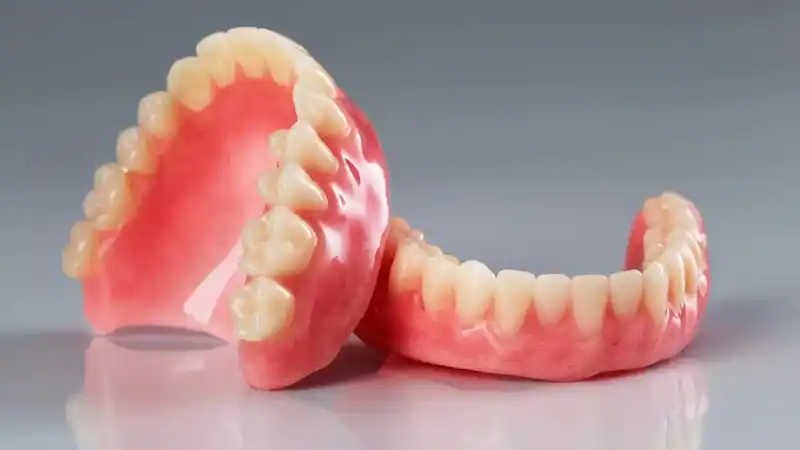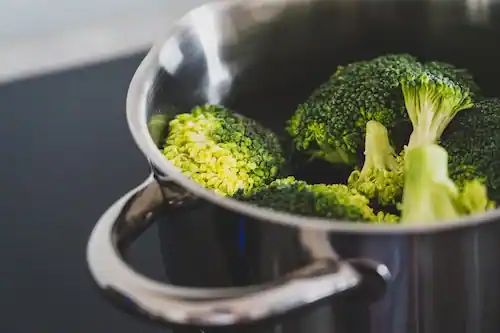If you wear dentures, meal planning requires careful consideration. Some foods may pose challenges that outweigh their nutritional benefits and should be avoided.
In life, some things can be improved with a little advance planning. This is especially true if you have dentures to replace missing teeth. Gone are the days of spontaneous snacking or impromptu dinner dates without considering the menu. Planning ahead is crucial for mealtime success with dentures.
Planning ahead: the key to successful meals with dentures
If you’ve recently replaced missing teeth with dentures, you’ve likely undergone tooth extraction and your mouth is still healing, making it sore. As a result, you’ll need to be careful in selecting the right foods for your diet.
Nutritious liquids such as juices, applesauce, smoothies, mashed potatoes, pudding, and soup that’s not too hot are all great options. Drinking your meals through a straw and ensuring you’re getting enough nutrition are key to your recovery.
You can either look for restaurants that serve these types of foods or prepare your own liquid diet in advance and bring it with you. Alternatively, you could invite guests over instead of going out, as you may not feel up to leaving home.
For quick trips, consider packing snacks like applesauce or fruit and veggie pouches that can be squeezed into your mouth, or prepackaged drinkable yogurt, similar to what a mom might pack for their child.
Essential kitchen tools for preparing a denture-friendly diet
When preparing a denture-friendly diet, having the right kitchen tools is essential. Here are some useful tools to consider:
- Immersion blender: Perfect for blending soups and other liquids to a smooth consistency.
- Food processor: Useful for chopping and blending soft foods like mashed potatoes, cooked vegetables, and fruits.
- Juicer: Great for making fresh, nutritious juices.
- Blender: Useful for creating smoothies and shakes.
It’s important to note that you may need to stick to a liquid diet for the first three to four weeks after getting dentures before transitioning to soft foods. These kitchen tools will help make meal preparation easier during this time.
Comfortable and gradual progression to solid foods for denture wearers
Adapting to chewing and biting with dentures takes time, as your gums need to adjust to the pressure. It’s important to choose soft foods that are comfortable to chew as you ease back into eating solid foods.
Once you’ve mastered foods like applesauce and mashed vegetables, you can move on to slightly more solid options. However, it’s important to keep these foods in small, bite-sized pieces to make chewing as comfortable as possible.
Some soft food options for denture wearers include:
- Baked beans
- Fresh, skin-free fish
- Cooked greens
- Pasta
- Cooked rice
- Soft bread
By gradually introducing solid foods in small portions, you can help your mouth adjust to chewing and make the transition to a regular diet more comfortable.
More food to enjoy with dentures
If you’re looking for more alternatives, try adding these denture-friendly options to your diet:
- Slow-cooked meats: Cooking meat slowly makes it more tender and flavorful. Try dishes like beef brisket, pulled pork, or pot roast.
- Ground meats: Ground meat is easy to eat with dentures as it’s less tough. You can use it in various recipes, such as casseroles, tacos, and meat pies. If you want to opt for a leaner meat, try ground turkey.
- Non-nut protein spreads: If you enjoy the taste and protein content of peanut butter, try hummus made from chickpeas, which has a mild flavor and pairs well with spices. For a sweeter alternative, cream cheese is a good choice.
- Chocolate: Chocolate is still an option for denture wearers as long as you avoid candy bars with nuts or toffee. Indulge in a few handmade chocolates or an indulgent European chocolate bar.
- Ripe fruits: Many fruits become soft when they ripen, making them easier to eat. Try oranges, tomatoes, peaches, bananas, or mangos, and mix them with ice cream or frozen yogurt for a refreshing smoothie.
- Cooked vegetables: Raw vegetables can be tough to eat, but boiling, steaming, or microwaving them will soften their texture. With a wide variety of veggies available, you can enjoy them in various dishes and never get bored with this healthy food group.
Considerations for denture wearers: what to avoid
When you have dentures, it’s important to be mindful of the foods you eat. Certain foods can cause problems such as denture sores, loose dentures, and bad breath. Here are some foods to avoid:
- Tough meat: Chewing on tough meat can cause denture sores on your gums. It’s best to opt for softer meats that are easier to chew.
- Hard foods: Biting and chewing on hard foods can cause uneven bite pressure, which can lead to loose or damaged dentures. Foods like carrots, corn on the cob, nuts, apples, and popcorn should be avoided.
- Sticky foods: Sticky foods can pull dentures loose and cause food to get stuck underneath them, leading to gum irritation and bad breath.
- Foods with small pieces: Foods like nuts, popcorn kernels, and seeds can break off into small pieces that are difficult to chew and can get stuck under your dentures.
By avoiding these problem foods, you can help ensure your dentures stay in good condition and your mouth stays healthy.
Adjusting to eating with dentures
It’s important to manage your expectations when it comes to eating with dentures. While you may be able to eat a wider variety of foods once you’ve adjusted to your dentures, you will never be able to bite and chew like you did with your natural teeth.
Dentures can cause food to get stuck underneath them and irritate your gums, and they may become loose while you’re eating, making it difficult to speak and chew properly. However, with practice and patience, you can learn to eat comfortably and confidently with dentures.
Start with softer foods and cut them into smaller pieces to make them easier to chew. Chew slowly and use both sides of your mouth to evenly distribute the pressure. As you become more comfortable, you can gradually introduce harder and tougher foods into your diet.
While you may never be able to eat like you did with your natural teeth, with proper care and maintenance, your dentures can help you enjoy a healthy and satisfying diet.
Replacement teeth that can really bite
If you’re tired of planning your meals around your dentures or drinking through a straw, consider switching to full mouth dental implants. At Dental & Implant Centers Of Colorado, we offer cutting-edge technology and processes to provide custom-made, permanent dental implants in just 24 hours.
With our implants, you can enjoy soft foods immediately after surgery and gradually regain your bite force over a few months. Unlike traditional dentures, our implants are securely integrated into your mouth, allowing you to eat anything you want, from steak to nuts.
If you’re interested in learning more about replacing your teeth, we’re here to help. At Dental & Implant Centers Of Colorado, we’re dedicated to educating our patients and answering all of their questions. Say goodbye to meal planning and hello to a new, confident smile. Contact us today!






